Director's Duties: A Comparison of Common Law and CA 2006
VerifiedAdded on 2020/04/29
|12
|2902
|306
Report
AI Summary
This report provides a detailed analysis of director's duties as outlined in the Companies Act 2006, contrasting them with the principles established under common law. The report focuses on sections 175 and 176 of the Act, which address the duties to avoid conflicts of interest and to refrain from accepting benefits from third parties, respectively. It examines the evolution of these duties, highlighting the shifts from the common law position and the introduction of statutory requirements. The analysis includes relevant case laws such as Boardman v Phipps, Attorney-General for Hong Kong v Reid, Aberdeen Rly Ltd. v Blaikie Brothers, Cambridge v Makin, Guinness Plc. v Sanders, Group Ltd v. Pyke, Bhullar v Bhullar, Howard Smith v Ampol, Re Smith and Fawcett Ltd, Regal (Hastings) Ltd v. Gulliver, CMS Dolphin Ltd v. Simonet, and General Exchange Bank v. Horner. The report also explores the differences in the application of shareholder approval and board authorization, and the defenses available to directors under the Act. The conclusion summarizes the key findings and the clear framework that the current provisions represent regarding director's behavior in these areas.

Running Head: Law 1
Law
Law
Paraphrase This Document
Need a fresh take? Get an instant paraphrase of this document with our AI Paraphraser
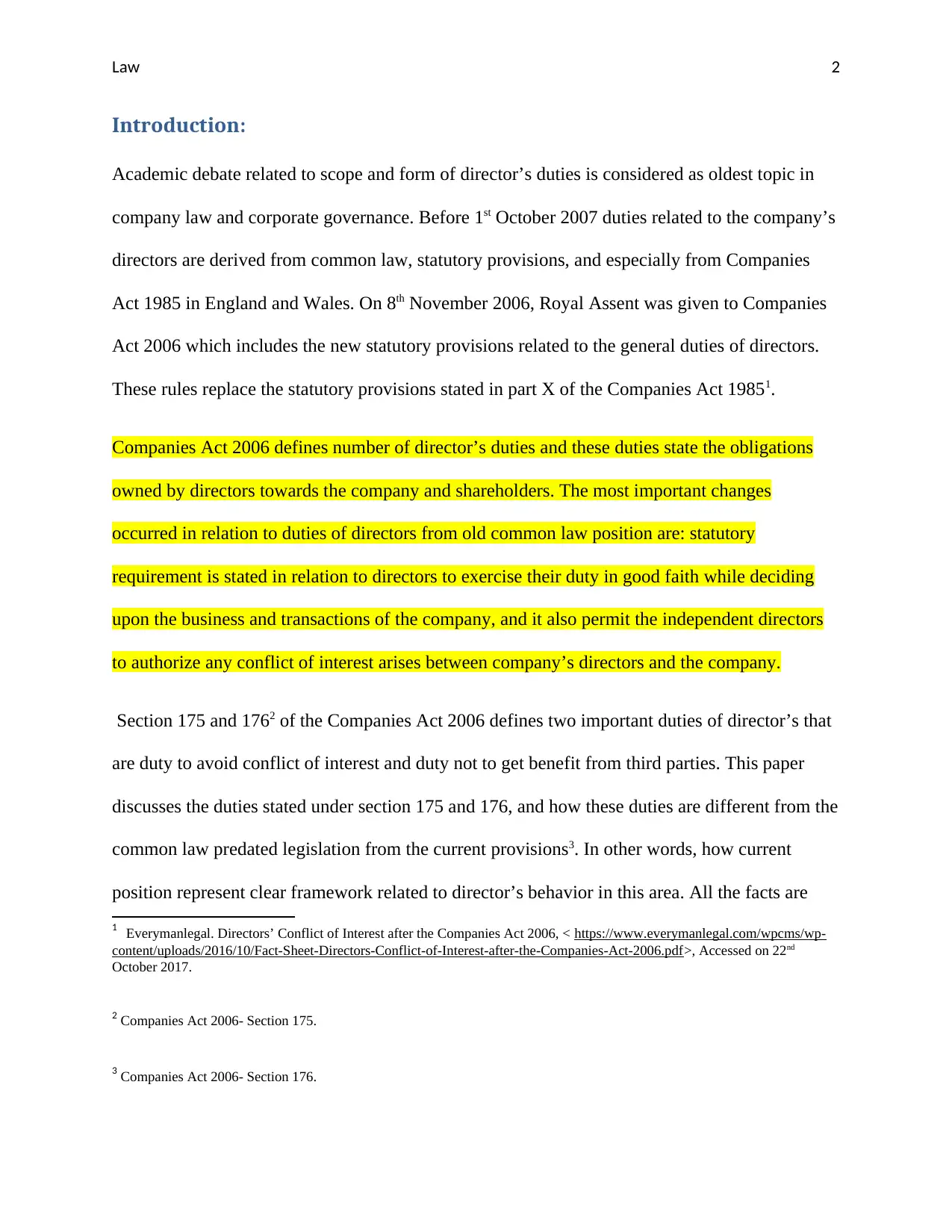
Law 2
Introduction:
Academic debate related to scope and form of director’s duties is considered as oldest topic in
company law and corporate governance. Before 1st October 2007 duties related to the company’s
directors are derived from common law, statutory provisions, and especially from Companies
Act 1985 in England and Wales. On 8th November 2006, Royal Assent was given to Companies
Act 2006 which includes the new statutory provisions related to the general duties of directors.
These rules replace the statutory provisions stated in part X of the Companies Act 19851.
Companies Act 2006 defines number of director’s duties and these duties state the obligations
owned by directors towards the company and shareholders. The most important changes
occurred in relation to duties of directors from old common law position are: statutory
requirement is stated in relation to directors to exercise their duty in good faith while deciding
upon the business and transactions of the company, and it also permit the independent directors
to authorize any conflict of interest arises between company’s directors and the company.
Section 175 and 1762 of the Companies Act 2006 defines two important duties of director’s that
are duty to avoid conflict of interest and duty not to get benefit from third parties. This paper
discusses the duties stated under section 175 and 176, and how these duties are different from the
common law predated legislation from the current provisions3. In other words, how current
position represent clear framework related to director’s behavior in this area. All the facts are
1 Everymanlegal. Directors’ Conflict of Interest after the Companies Act 2006, < https://www.everymanlegal.com/wpcms/wp-
content/uploads/2016/10/Fact-Sheet-Directors-Conflict-of-Interest-after-the-Companies-Act-2006.pdf>, Accessed on 22nd
October 2017.
2 Companies Act 2006- Section 175.
3 Companies Act 2006- Section 176.
Introduction:
Academic debate related to scope and form of director’s duties is considered as oldest topic in
company law and corporate governance. Before 1st October 2007 duties related to the company’s
directors are derived from common law, statutory provisions, and especially from Companies
Act 1985 in England and Wales. On 8th November 2006, Royal Assent was given to Companies
Act 2006 which includes the new statutory provisions related to the general duties of directors.
These rules replace the statutory provisions stated in part X of the Companies Act 19851.
Companies Act 2006 defines number of director’s duties and these duties state the obligations
owned by directors towards the company and shareholders. The most important changes
occurred in relation to duties of directors from old common law position are: statutory
requirement is stated in relation to directors to exercise their duty in good faith while deciding
upon the business and transactions of the company, and it also permit the independent directors
to authorize any conflict of interest arises between company’s directors and the company.
Section 175 and 1762 of the Companies Act 2006 defines two important duties of director’s that
are duty to avoid conflict of interest and duty not to get benefit from third parties. This paper
discusses the duties stated under section 175 and 176, and how these duties are different from the
common law predated legislation from the current provisions3. In other words, how current
position represent clear framework related to director’s behavior in this area. All the facts are
1 Everymanlegal. Directors’ Conflict of Interest after the Companies Act 2006, < https://www.everymanlegal.com/wpcms/wp-
content/uploads/2016/10/Fact-Sheet-Directors-Conflict-of-Interest-after-the-Companies-Act-2006.pdf>, Accessed on 22nd
October 2017.
2 Companies Act 2006- Section 175.
3 Companies Act 2006- Section 176.
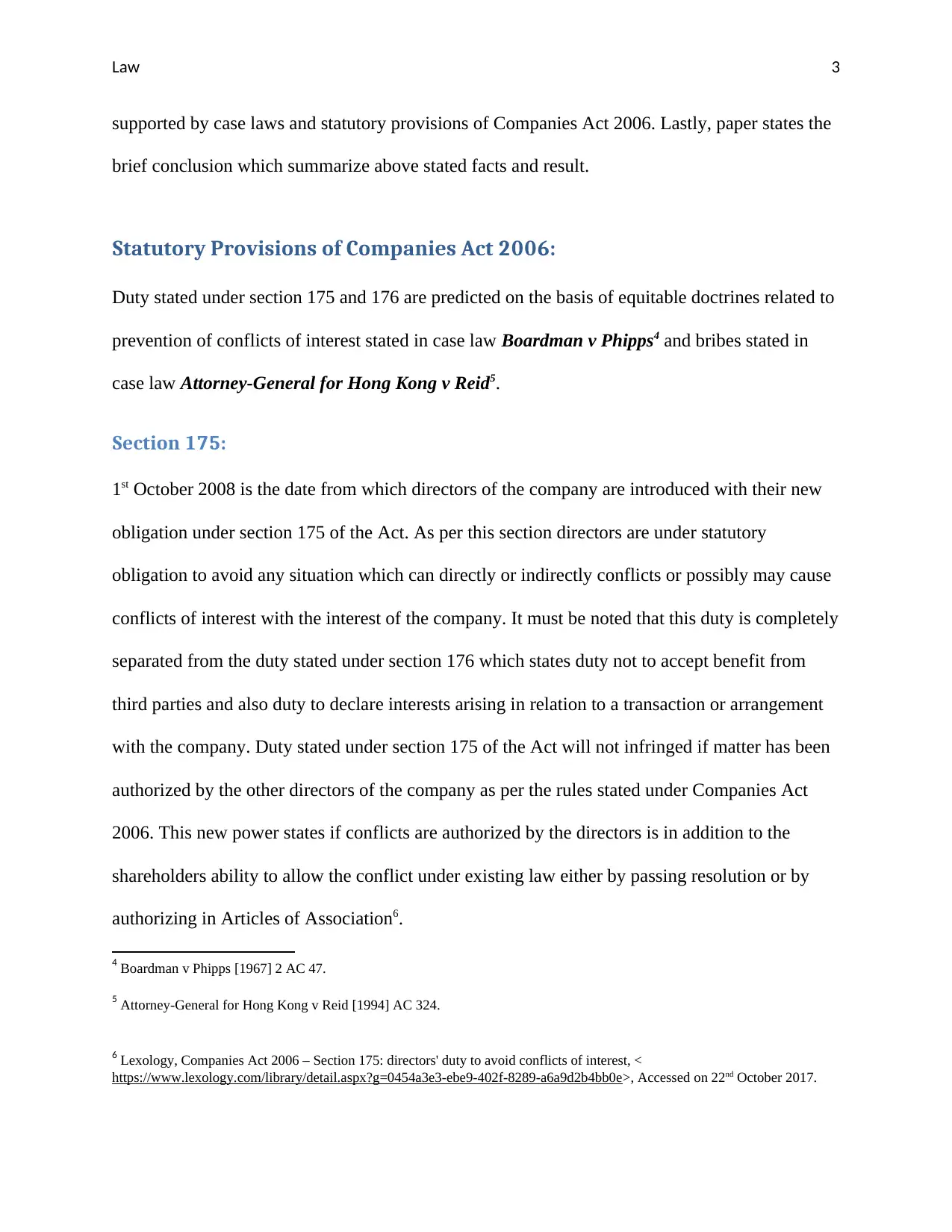
Law 3
supported by case laws and statutory provisions of Companies Act 2006. Lastly, paper states the
brief conclusion which summarize above stated facts and result.
Statutory Provisions of Companies Act 2006:
Duty stated under section 175 and 176 are predicted on the basis of equitable doctrines related to
prevention of conflicts of interest stated in case law Boardman v Phipps4 and bribes stated in
case law Attorney-General for Hong Kong v Reid5.
Section 175:
1st October 2008 is the date from which directors of the company are introduced with their new
obligation under section 175 of the Act. As per this section directors are under statutory
obligation to avoid any situation which can directly or indirectly conflicts or possibly may cause
conflicts of interest with the interest of the company. It must be noted that this duty is completely
separated from the duty stated under section 176 which states duty not to accept benefit from
third parties and also duty to declare interests arising in relation to a transaction or arrangement
with the company. Duty stated under section 175 of the Act will not infringed if matter has been
authorized by the other directors of the company as per the rules stated under Companies Act
2006. This new power states if conflicts are authorized by the directors is in addition to the
shareholders ability to allow the conflict under existing law either by passing resolution or by
authorizing in Articles of Association6.
4 Boardman v Phipps [1967] 2 AC 47.
5 Attorney-General for Hong Kong v Reid [1994] AC 324.
6 Lexology, Companies Act 2006 – Section 175: directors' duty to avoid conflicts of interest, <
https://www.lexology.com/library/detail.aspx?g=0454a3e3-ebe9-402f-8289-a6a9d2b4bb0e>, Accessed on 22nd October 2017.
supported by case laws and statutory provisions of Companies Act 2006. Lastly, paper states the
brief conclusion which summarize above stated facts and result.
Statutory Provisions of Companies Act 2006:
Duty stated under section 175 and 176 are predicted on the basis of equitable doctrines related to
prevention of conflicts of interest stated in case law Boardman v Phipps4 and bribes stated in
case law Attorney-General for Hong Kong v Reid5.
Section 175:
1st October 2008 is the date from which directors of the company are introduced with their new
obligation under section 175 of the Act. As per this section directors are under statutory
obligation to avoid any situation which can directly or indirectly conflicts or possibly may cause
conflicts of interest with the interest of the company. It must be noted that this duty is completely
separated from the duty stated under section 176 which states duty not to accept benefit from
third parties and also duty to declare interests arising in relation to a transaction or arrangement
with the company. Duty stated under section 175 of the Act will not infringed if matter has been
authorized by the other directors of the company as per the rules stated under Companies Act
2006. This new power states if conflicts are authorized by the directors is in addition to the
shareholders ability to allow the conflict under existing law either by passing resolution or by
authorizing in Articles of Association6.
4 Boardman v Phipps [1967] 2 AC 47.
5 Attorney-General for Hong Kong v Reid [1994] AC 324.
6 Lexology, Companies Act 2006 – Section 175: directors' duty to avoid conflicts of interest, <
https://www.lexology.com/library/detail.aspx?g=0454a3e3-ebe9-402f-8289-a6a9d2b4bb0e>, Accessed on 22nd October 2017.
⊘ This is a preview!⊘
Do you want full access?
Subscribe today to unlock all pages.

Trusted by 1+ million students worldwide
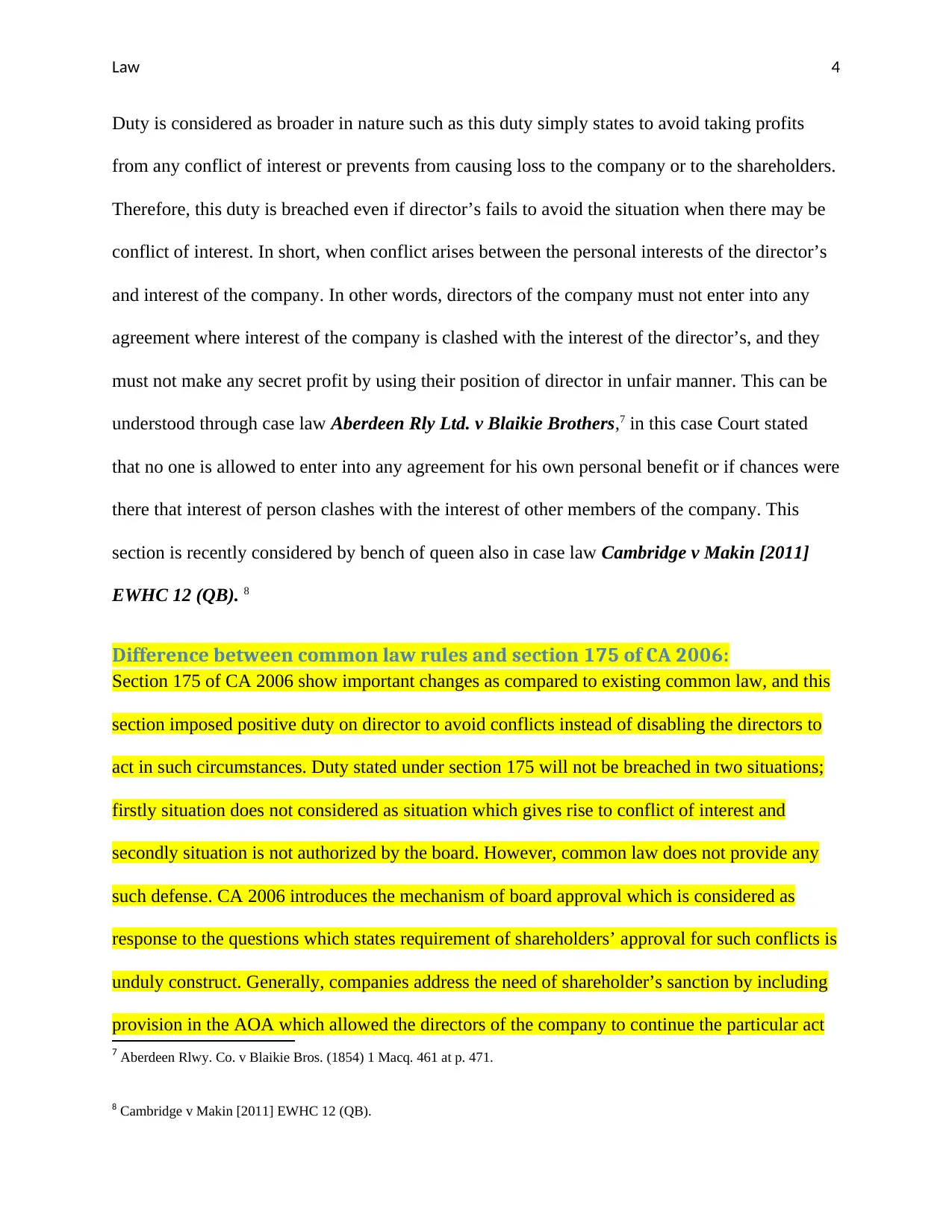
Law 4
Duty is considered as broader in nature such as this duty simply states to avoid taking profits
from any conflict of interest or prevents from causing loss to the company or to the shareholders.
Therefore, this duty is breached even if director’s fails to avoid the situation when there may be
conflict of interest. In short, when conflict arises between the personal interests of the director’s
and interest of the company. In other words, directors of the company must not enter into any
agreement where interest of the company is clashed with the interest of the director’s, and they
must not make any secret profit by using their position of director in unfair manner. This can be
understood through case law Aberdeen Rly Ltd. v Blaikie Brothers,7 in this case Court stated
that no one is allowed to enter into any agreement for his own personal benefit or if chances were
there that interest of person clashes with the interest of other members of the company. This
section is recently considered by bench of queen also in case law Cambridge v Makin [2011]
EWHC 12 (QB). 8
Difference between common law rules and section 175 of CA 2006:
Section 175 of CA 2006 show important changes as compared to existing common law, and this
section imposed positive duty on director to avoid conflicts instead of disabling the directors to
act in such circumstances. Duty stated under section 175 will not be breached in two situations;
firstly situation does not considered as situation which gives rise to conflict of interest and
secondly situation is not authorized by the board. However, common law does not provide any
such defense. CA 2006 introduces the mechanism of board approval which is considered as
response to the questions which states requirement of shareholders’ approval for such conflicts is
unduly construct. Generally, companies address the need of shareholder’s sanction by including
provision in the AOA which allowed the directors of the company to continue the particular act
7 Aberdeen Rlwy. Co. v Blaikie Bros. (1854) 1 Macq. 461 at p. 471.
8 Cambridge v Makin [2011] EWHC 12 (QB).
Duty is considered as broader in nature such as this duty simply states to avoid taking profits
from any conflict of interest or prevents from causing loss to the company or to the shareholders.
Therefore, this duty is breached even if director’s fails to avoid the situation when there may be
conflict of interest. In short, when conflict arises between the personal interests of the director’s
and interest of the company. In other words, directors of the company must not enter into any
agreement where interest of the company is clashed with the interest of the director’s, and they
must not make any secret profit by using their position of director in unfair manner. This can be
understood through case law Aberdeen Rly Ltd. v Blaikie Brothers,7 in this case Court stated
that no one is allowed to enter into any agreement for his own personal benefit or if chances were
there that interest of person clashes with the interest of other members of the company. This
section is recently considered by bench of queen also in case law Cambridge v Makin [2011]
EWHC 12 (QB). 8
Difference between common law rules and section 175 of CA 2006:
Section 175 of CA 2006 show important changes as compared to existing common law, and this
section imposed positive duty on director to avoid conflicts instead of disabling the directors to
act in such circumstances. Duty stated under section 175 will not be breached in two situations;
firstly situation does not considered as situation which gives rise to conflict of interest and
secondly situation is not authorized by the board. However, common law does not provide any
such defense. CA 2006 introduces the mechanism of board approval which is considered as
response to the questions which states requirement of shareholders’ approval for such conflicts is
unduly construct. Generally, companies address the need of shareholder’s sanction by including
provision in the AOA which allowed the directors of the company to continue the particular act
7 Aberdeen Rlwy. Co. v Blaikie Bros. (1854) 1 Macq. 461 at p. 471.
8 Cambridge v Makin [2011] EWHC 12 (QB).
Paraphrase This Document
Need a fresh take? Get an instant paraphrase of this document with our AI Paraphraser
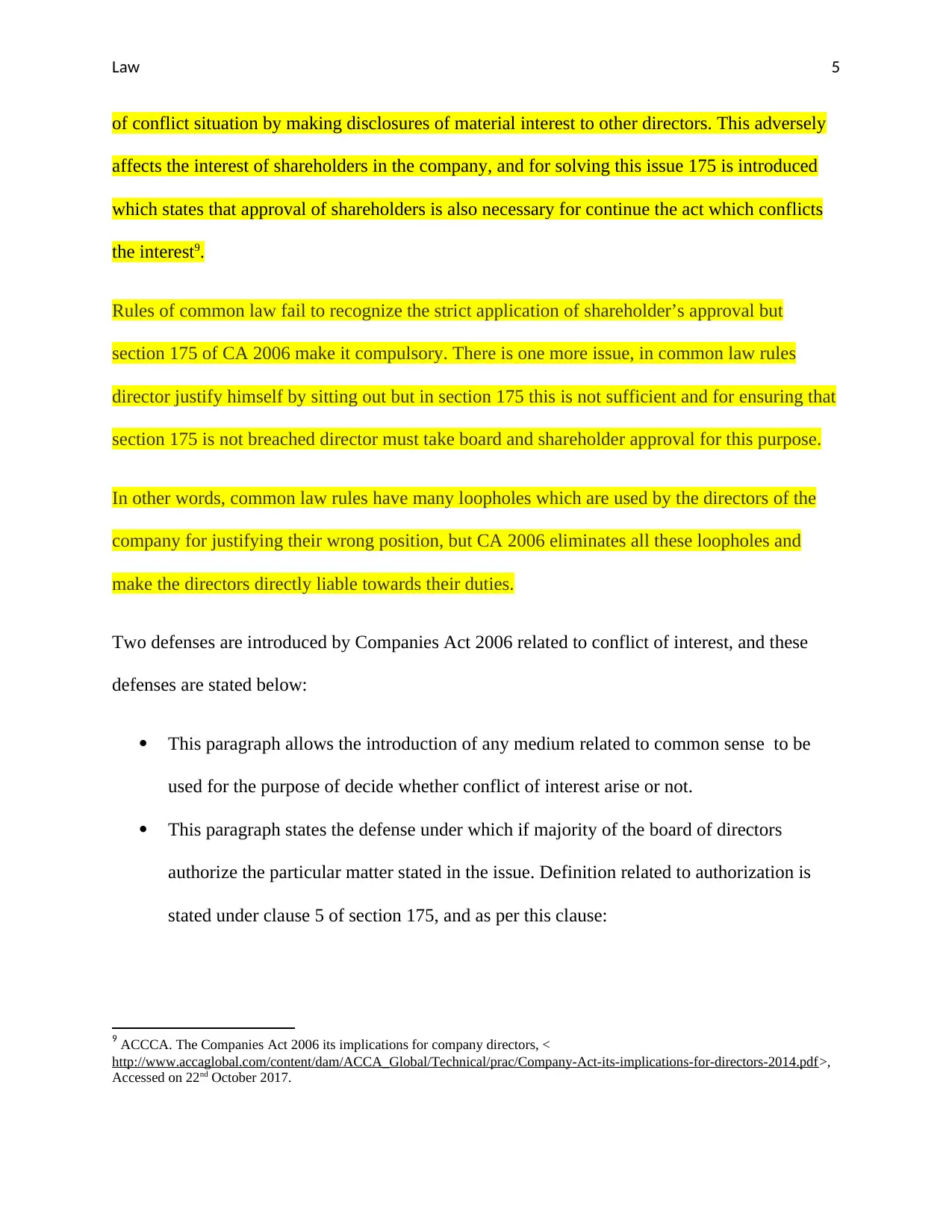
Law 5
of conflict situation by making disclosures of material interest to other directors. This adversely
affects the interest of shareholders in the company, and for solving this issue 175 is introduced
which states that approval of shareholders is also necessary for continue the act which conflicts
the interest9.
Rules of common law fail to recognize the strict application of shareholder’s approval but
section 175 of CA 2006 make it compulsory. There is one more issue, in common law rules
director justify himself by sitting out but in section 175 this is not sufficient and for ensuring that
section 175 is not breached director must take board and shareholder approval for this purpose.
In other words, common law rules have many loopholes which are used by the directors of the
company for justifying their wrong position, but CA 2006 eliminates all these loopholes and
make the directors directly liable towards their duties.
Two defenses are introduced by Companies Act 2006 related to conflict of interest, and these
defenses are stated below:
This paragraph allows the introduction of any medium related to common sense to be
used for the purpose of decide whether conflict of interest arise or not.
This paragraph states the defense under which if majority of the board of directors
authorize the particular matter stated in the issue. Definition related to authorization is
stated under clause 5 of section 175, and as per this clause:
9 ACCCA. The Companies Act 2006 its implications for company directors, <
http://www.accaglobal.com/content/dam/ACCA_Global/Technical/prac/Company-Act-its-implications-for-directors-2014.pdf>,
Accessed on 22nd October 2017.
of conflict situation by making disclosures of material interest to other directors. This adversely
affects the interest of shareholders in the company, and for solving this issue 175 is introduced
which states that approval of shareholders is also necessary for continue the act which conflicts
the interest9.
Rules of common law fail to recognize the strict application of shareholder’s approval but
section 175 of CA 2006 make it compulsory. There is one more issue, in common law rules
director justify himself by sitting out but in section 175 this is not sufficient and for ensuring that
section 175 is not breached director must take board and shareholder approval for this purpose.
In other words, common law rules have many loopholes which are used by the directors of the
company for justifying their wrong position, but CA 2006 eliminates all these loopholes and
make the directors directly liable towards their duties.
Two defenses are introduced by Companies Act 2006 related to conflict of interest, and these
defenses are stated below:
This paragraph allows the introduction of any medium related to common sense to be
used for the purpose of decide whether conflict of interest arise or not.
This paragraph states the defense under which if majority of the board of directors
authorize the particular matter stated in the issue. Definition related to authorization is
stated under clause 5 of section 175, and as per this clause:
9 ACCCA. The Companies Act 2006 its implications for company directors, <
http://www.accaglobal.com/content/dam/ACCA_Global/Technical/prac/Company-Act-its-implications-for-directors-2014.pdf>,
Accessed on 22nd October 2017.
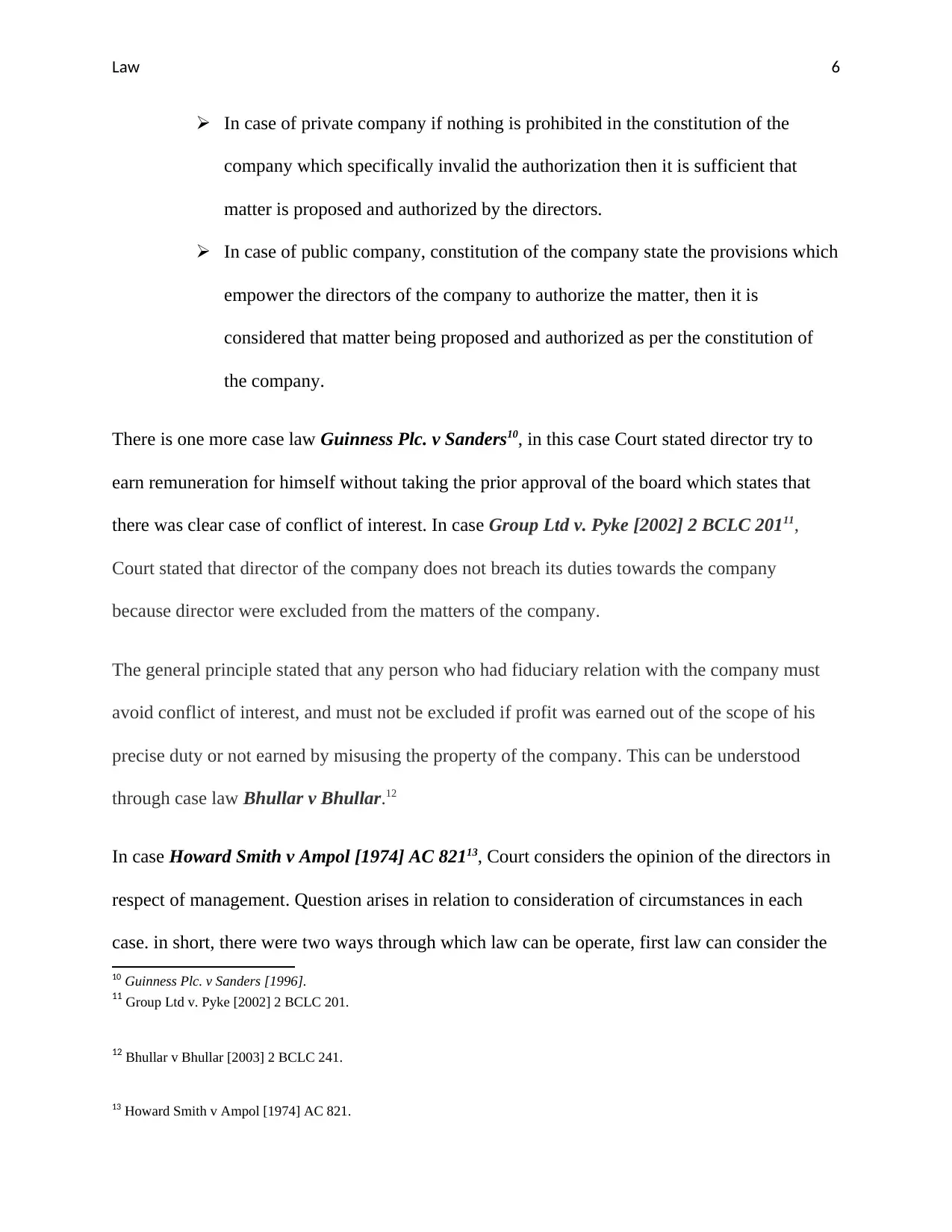
Law 6
In case of private company if nothing is prohibited in the constitution of the
company which specifically invalid the authorization then it is sufficient that
matter is proposed and authorized by the directors.
In case of public company, constitution of the company state the provisions which
empower the directors of the company to authorize the matter, then it is
considered that matter being proposed and authorized as per the constitution of
the company.
There is one more case law Guinness Plc. v Sanders10, in this case Court stated director try to
earn remuneration for himself without taking the prior approval of the board which states that
there was clear case of conflict of interest. In case Group Ltd v. Pyke [2002] 2 BCLC 20111,
Court stated that director of the company does not breach its duties towards the company
because director were excluded from the matters of the company.
The general principle stated that any person who had fiduciary relation with the company must
avoid conflict of interest, and must not be excluded if profit was earned out of the scope of his
precise duty or not earned by misusing the property of the company. This can be understood
through case law Bhullar v Bhullar.12
In case Howard Smith v Ampol [1974] AC 82113, Court considers the opinion of the directors in
respect of management. Question arises in relation to consideration of circumstances in each
case. in short, there were two ways through which law can be operate, first law can consider the
10 Guinness Plc. v Sanders [1996].
11 Group Ltd v. Pyke [2002] 2 BCLC 201.
12 Bhullar v Bhullar [2003] 2 BCLC 241.
13 Howard Smith v Ampol [1974] AC 821.
In case of private company if nothing is prohibited in the constitution of the
company which specifically invalid the authorization then it is sufficient that
matter is proposed and authorized by the directors.
In case of public company, constitution of the company state the provisions which
empower the directors of the company to authorize the matter, then it is
considered that matter being proposed and authorized as per the constitution of
the company.
There is one more case law Guinness Plc. v Sanders10, in this case Court stated director try to
earn remuneration for himself without taking the prior approval of the board which states that
there was clear case of conflict of interest. In case Group Ltd v. Pyke [2002] 2 BCLC 20111,
Court stated that director of the company does not breach its duties towards the company
because director were excluded from the matters of the company.
The general principle stated that any person who had fiduciary relation with the company must
avoid conflict of interest, and must not be excluded if profit was earned out of the scope of his
precise duty or not earned by misusing the property of the company. This can be understood
through case law Bhullar v Bhullar.12
In case Howard Smith v Ampol [1974] AC 82113, Court considers the opinion of the directors in
respect of management. Question arises in relation to consideration of circumstances in each
case. in short, there were two ways through which law can be operate, first law can consider the
10 Guinness Plc. v Sanders [1996].
11 Group Ltd v. Pyke [2002] 2 BCLC 201.
12 Bhullar v Bhullar [2003] 2 BCLC 241.
13 Howard Smith v Ampol [1974] AC 821.
⊘ This is a preview!⊘
Do you want full access?
Subscribe today to unlock all pages.

Trusted by 1+ million students worldwide
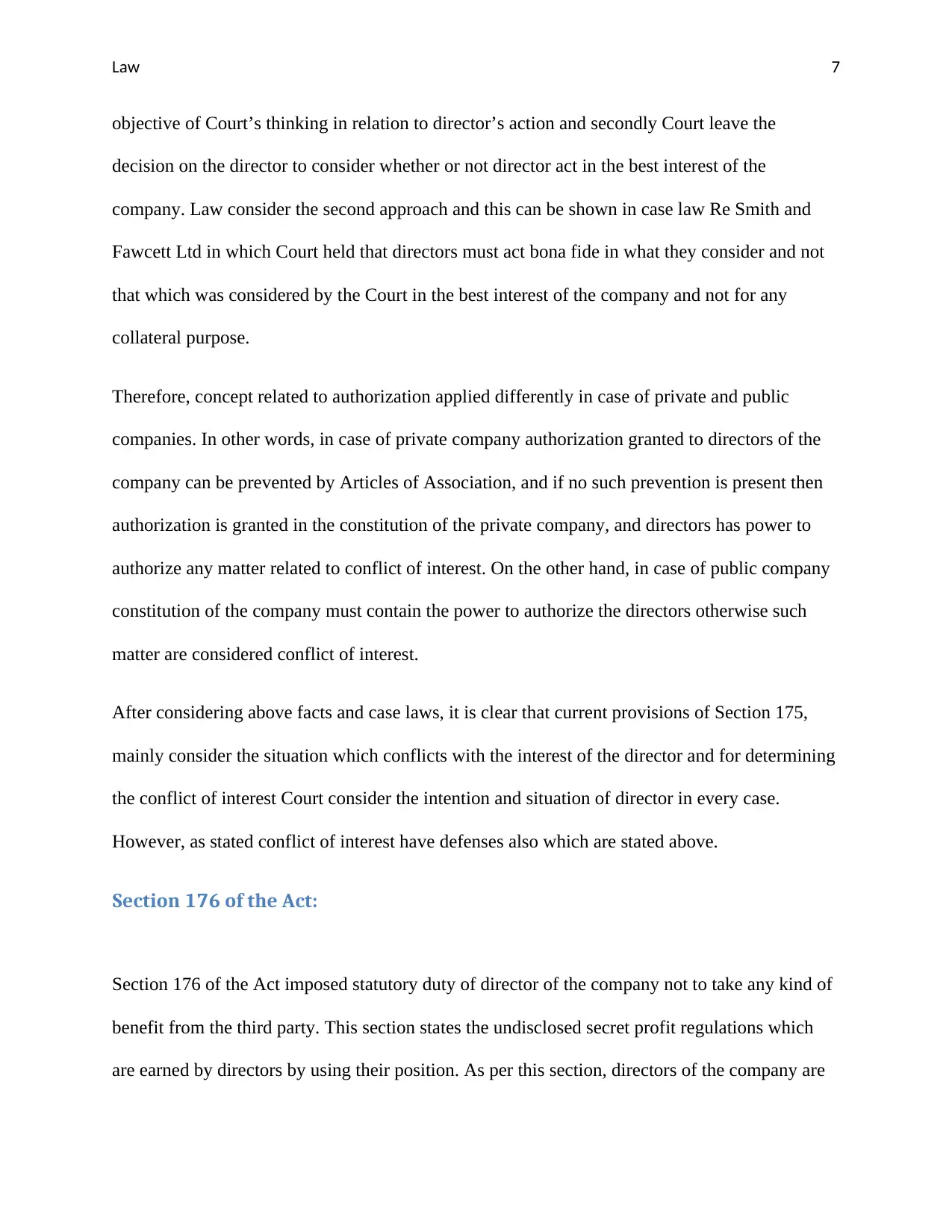
Law 7
objective of Court’s thinking in relation to director’s action and secondly Court leave the
decision on the director to consider whether or not director act in the best interest of the
company. Law consider the second approach and this can be shown in case law Re Smith and
Fawcett Ltd in which Court held that directors must act bona fide in what they consider and not
that which was considered by the Court in the best interest of the company and not for any
collateral purpose.
Therefore, concept related to authorization applied differently in case of private and public
companies. In other words, in case of private company authorization granted to directors of the
company can be prevented by Articles of Association, and if no such prevention is present then
authorization is granted in the constitution of the private company, and directors has power to
authorize any matter related to conflict of interest. On the other hand, in case of public company
constitution of the company must contain the power to authorize the directors otherwise such
matter are considered conflict of interest.
After considering above facts and case laws, it is clear that current provisions of Section 175,
mainly consider the situation which conflicts with the interest of the director and for determining
the conflict of interest Court consider the intention and situation of director in every case.
However, as stated conflict of interest have defenses also which are stated above.
Section 176 of the Act:
Section 176 of the Act imposed statutory duty of director of the company not to take any kind of
benefit from the third party. This section states the undisclosed secret profit regulations which
are earned by directors by using their position. As per this section, directors of the company are
objective of Court’s thinking in relation to director’s action and secondly Court leave the
decision on the director to consider whether or not director act in the best interest of the
company. Law consider the second approach and this can be shown in case law Re Smith and
Fawcett Ltd in which Court held that directors must act bona fide in what they consider and not
that which was considered by the Court in the best interest of the company and not for any
collateral purpose.
Therefore, concept related to authorization applied differently in case of private and public
companies. In other words, in case of private company authorization granted to directors of the
company can be prevented by Articles of Association, and if no such prevention is present then
authorization is granted in the constitution of the private company, and directors has power to
authorize any matter related to conflict of interest. On the other hand, in case of public company
constitution of the company must contain the power to authorize the directors otherwise such
matter are considered conflict of interest.
After considering above facts and case laws, it is clear that current provisions of Section 175,
mainly consider the situation which conflicts with the interest of the director and for determining
the conflict of interest Court consider the intention and situation of director in every case.
However, as stated conflict of interest have defenses also which are stated above.
Section 176 of the Act:
Section 176 of the Act imposed statutory duty of director of the company not to take any kind of
benefit from the third party. This section states the undisclosed secret profit regulations which
are earned by directors by using their position. As per this section, directors of the company are
Paraphrase This Document
Need a fresh take? Get an instant paraphrase of this document with our AI Paraphraser
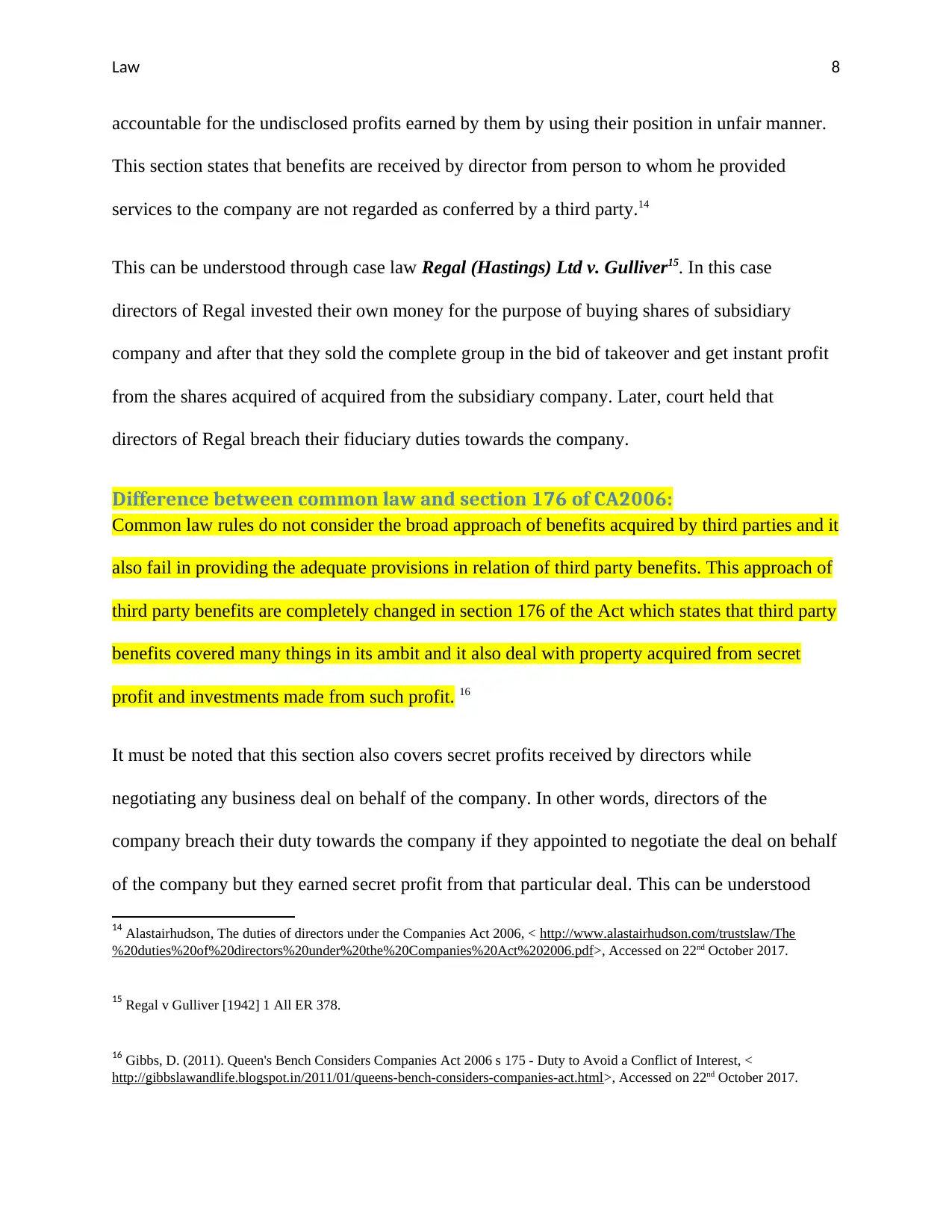
Law 8
accountable for the undisclosed profits earned by them by using their position in unfair manner.
This section states that benefits are received by director from person to whom he provided
services to the company are not regarded as conferred by a third party.14
This can be understood through case law Regal (Hastings) Ltd v. Gulliver15. In this case
directors of Regal invested their own money for the purpose of buying shares of subsidiary
company and after that they sold the complete group in the bid of takeover and get instant profit
from the shares acquired of acquired from the subsidiary company. Later, court held that
directors of Regal breach their fiduciary duties towards the company.
Difference between common law and section 176 of CA2006:
Common law rules do not consider the broad approach of benefits acquired by third parties and it
also fail in providing the adequate provisions in relation of third party benefits. This approach of
third party benefits are completely changed in section 176 of the Act which states that third party
benefits covered many things in its ambit and it also deal with property acquired from secret
profit and investments made from such profit. 16
It must be noted that this section also covers secret profits received by directors while
negotiating any business deal on behalf of the company. In other words, directors of the
company breach their duty towards the company if they appointed to negotiate the deal on behalf
of the company but they earned secret profit from that particular deal. This can be understood
14 Alastairhudson, The duties of directors under the Companies Act 2006, < http://www.alastairhudson.com/trustslaw/The
%20duties%20of%20directors%20under%20the%20Companies%20Act%202006.pdf>, Accessed on 22nd October 2017.
15 Regal v Gulliver [1942] 1 All ER 378.
16 Gibbs, D. (2011). Queen's Bench Considers Companies Act 2006 s 175 - Duty to Avoid a Conflict of Interest, <
http://gibbslawandlife.blogspot.in/2011/01/queens-bench-considers-companies-act.html>, Accessed on 22nd October 2017.
accountable for the undisclosed profits earned by them by using their position in unfair manner.
This section states that benefits are received by director from person to whom he provided
services to the company are not regarded as conferred by a third party.14
This can be understood through case law Regal (Hastings) Ltd v. Gulliver15. In this case
directors of Regal invested their own money for the purpose of buying shares of subsidiary
company and after that they sold the complete group in the bid of takeover and get instant profit
from the shares acquired of acquired from the subsidiary company. Later, court held that
directors of Regal breach their fiduciary duties towards the company.
Difference between common law and section 176 of CA2006:
Common law rules do not consider the broad approach of benefits acquired by third parties and it
also fail in providing the adequate provisions in relation of third party benefits. This approach of
third party benefits are completely changed in section 176 of the Act which states that third party
benefits covered many things in its ambit and it also deal with property acquired from secret
profit and investments made from such profit. 16
It must be noted that this section also covers secret profits received by directors while
negotiating any business deal on behalf of the company. In other words, directors of the
company breach their duty towards the company if they appointed to negotiate the deal on behalf
of the company but they earned secret profit from that particular deal. This can be understood
14 Alastairhudson, The duties of directors under the Companies Act 2006, < http://www.alastairhudson.com/trustslaw/The
%20duties%20of%20directors%20under%20the%20Companies%20Act%202006.pdf>, Accessed on 22nd October 2017.
15 Regal v Gulliver [1942] 1 All ER 378.
16 Gibbs, D. (2011). Queen's Bench Considers Companies Act 2006 s 175 - Duty to Avoid a Conflict of Interest, <
http://gibbslawandlife.blogspot.in/2011/01/queens-bench-considers-companies-act.html>, Accessed on 22nd October 2017.
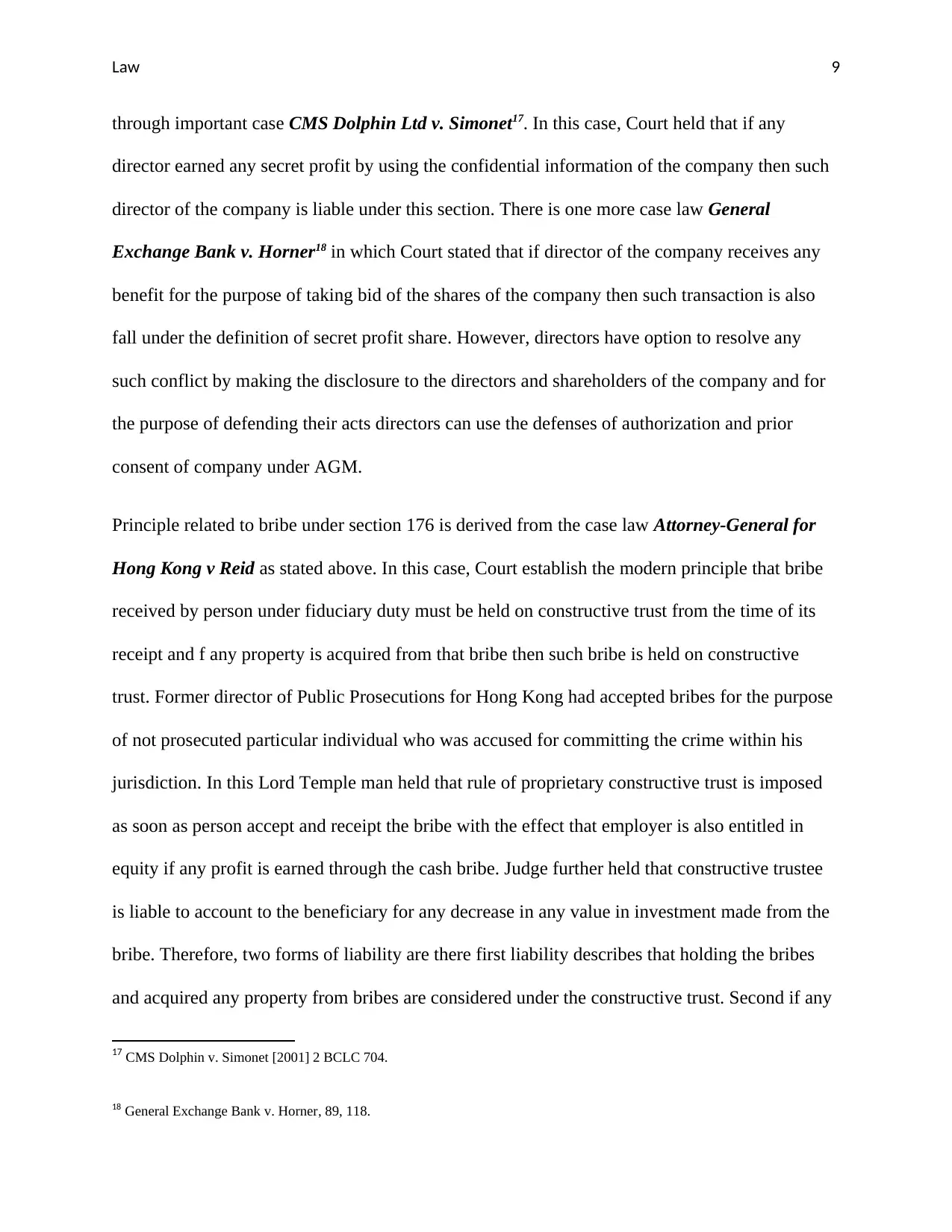
Law 9
through important case CMS Dolphin Ltd v. Simonet17. In this case, Court held that if any
director earned any secret profit by using the confidential information of the company then such
director of the company is liable under this section. There is one more case law General
Exchange Bank v. Horner18 in which Court stated that if director of the company receives any
benefit for the purpose of taking bid of the shares of the company then such transaction is also
fall under the definition of secret profit share. However, directors have option to resolve any
such conflict by making the disclosure to the directors and shareholders of the company and for
the purpose of defending their acts directors can use the defenses of authorization and prior
consent of company under AGM.
Principle related to bribe under section 176 is derived from the case law Attorney-General for
Hong Kong v Reid as stated above. In this case, Court establish the modern principle that bribe
received by person under fiduciary duty must be held on constructive trust from the time of its
receipt and f any property is acquired from that bribe then such bribe is held on constructive
trust. Former director of Public Prosecutions for Hong Kong had accepted bribes for the purpose
of not prosecuted particular individual who was accused for committing the crime within his
jurisdiction. In this Lord Temple man held that rule of proprietary constructive trust is imposed
as soon as person accept and receipt the bribe with the effect that employer is also entitled in
equity if any profit is earned through the cash bribe. Judge further held that constructive trustee
is liable to account to the beneficiary for any decrease in any value in investment made from the
bribe. Therefore, two forms of liability are there first liability describes that holding the bribes
and acquired any property from bribes are considered under the constructive trust. Second if any
17 CMS Dolphin v. Simonet [2001] 2 BCLC 704.
18 General Exchange Bank v. Horner, 89, 118.
through important case CMS Dolphin Ltd v. Simonet17. In this case, Court held that if any
director earned any secret profit by using the confidential information of the company then such
director of the company is liable under this section. There is one more case law General
Exchange Bank v. Horner18 in which Court stated that if director of the company receives any
benefit for the purpose of taking bid of the shares of the company then such transaction is also
fall under the definition of secret profit share. However, directors have option to resolve any
such conflict by making the disclosure to the directors and shareholders of the company and for
the purpose of defending their acts directors can use the defenses of authorization and prior
consent of company under AGM.
Principle related to bribe under section 176 is derived from the case law Attorney-General for
Hong Kong v Reid as stated above. In this case, Court establish the modern principle that bribe
received by person under fiduciary duty must be held on constructive trust from the time of its
receipt and f any property is acquired from that bribe then such bribe is held on constructive
trust. Former director of Public Prosecutions for Hong Kong had accepted bribes for the purpose
of not prosecuted particular individual who was accused for committing the crime within his
jurisdiction. In this Lord Temple man held that rule of proprietary constructive trust is imposed
as soon as person accept and receipt the bribe with the effect that employer is also entitled in
equity if any profit is earned through the cash bribe. Judge further held that constructive trustee
is liable to account to the beneficiary for any decrease in any value in investment made from the
bribe. Therefore, two forms of liability are there first liability describes that holding the bribes
and acquired any property from bribes are considered under the constructive trust. Second if any
17 CMS Dolphin v. Simonet [2001] 2 BCLC 704.
18 General Exchange Bank v. Horner, 89, 118.
⊘ This is a preview!⊘
Do you want full access?
Subscribe today to unlock all pages.

Trusted by 1+ million students worldwide
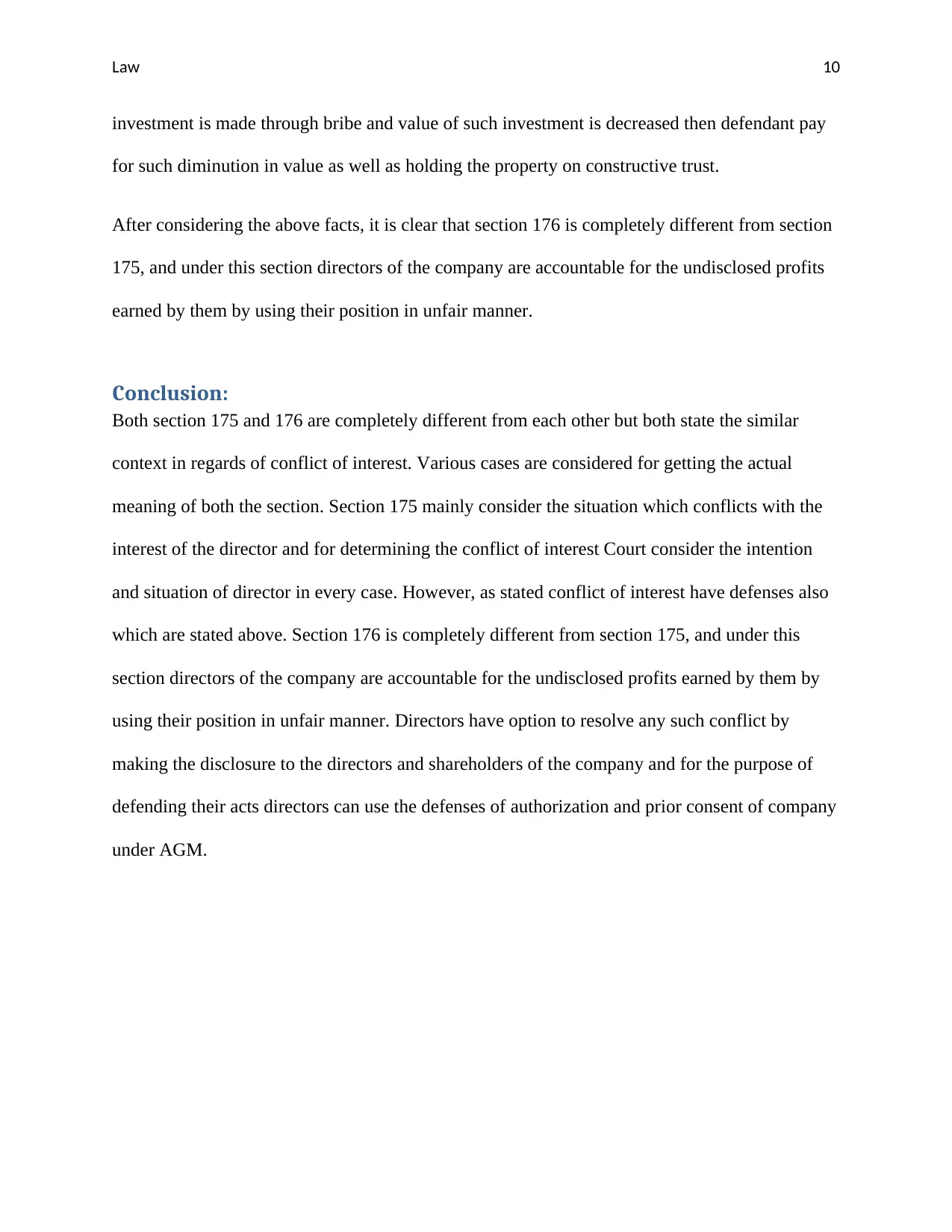
Law 10
investment is made through bribe and value of such investment is decreased then defendant pay
for such diminution in value as well as holding the property on constructive trust.
After considering the above facts, it is clear that section 176 is completely different from section
175, and under this section directors of the company are accountable for the undisclosed profits
earned by them by using their position in unfair manner.
Conclusion:
Both section 175 and 176 are completely different from each other but both state the similar
context in regards of conflict of interest. Various cases are considered for getting the actual
meaning of both the section. Section 175 mainly consider the situation which conflicts with the
interest of the director and for determining the conflict of interest Court consider the intention
and situation of director in every case. However, as stated conflict of interest have defenses also
which are stated above. Section 176 is completely different from section 175, and under this
section directors of the company are accountable for the undisclosed profits earned by them by
using their position in unfair manner. Directors have option to resolve any such conflict by
making the disclosure to the directors and shareholders of the company and for the purpose of
defending their acts directors can use the defenses of authorization and prior consent of company
under AGM.
investment is made through bribe and value of such investment is decreased then defendant pay
for such diminution in value as well as holding the property on constructive trust.
After considering the above facts, it is clear that section 176 is completely different from section
175, and under this section directors of the company are accountable for the undisclosed profits
earned by them by using their position in unfair manner.
Conclusion:
Both section 175 and 176 are completely different from each other but both state the similar
context in regards of conflict of interest. Various cases are considered for getting the actual
meaning of both the section. Section 175 mainly consider the situation which conflicts with the
interest of the director and for determining the conflict of interest Court consider the intention
and situation of director in every case. However, as stated conflict of interest have defenses also
which are stated above. Section 176 is completely different from section 175, and under this
section directors of the company are accountable for the undisclosed profits earned by them by
using their position in unfair manner. Directors have option to resolve any such conflict by
making the disclosure to the directors and shareholders of the company and for the purpose of
defending their acts directors can use the defenses of authorization and prior consent of company
under AGM.
Paraphrase This Document
Need a fresh take? Get an instant paraphrase of this document with our AI Paraphraser
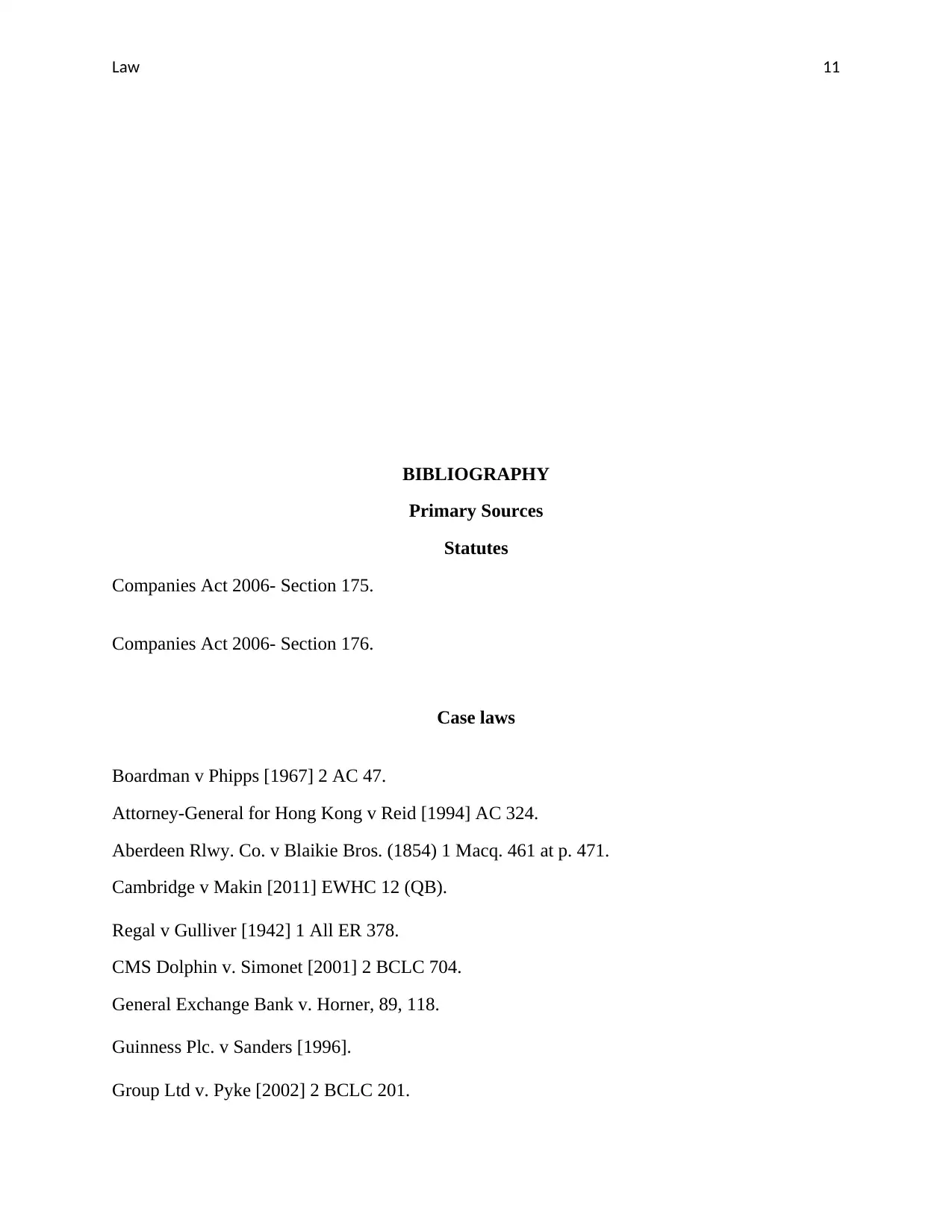
Law 11
BIBLIOGRAPHY
Primary Sources
Statutes
Companies Act 2006- Section 175.
Companies Act 2006- Section 176.
Case laws
Boardman v Phipps [1967] 2 AC 47.
Attorney-General for Hong Kong v Reid [1994] AC 324.
Aberdeen Rlwy. Co. v Blaikie Bros. (1854) 1 Macq. 461 at p. 471.
Cambridge v Makin [2011] EWHC 12 (QB).
Regal v Gulliver [1942] 1 All ER 378.
CMS Dolphin v. Simonet [2001] 2 BCLC 704.
General Exchange Bank v. Horner, 89, 118.
Guinness Plc. v Sanders [1996].
Group Ltd v. Pyke [2002] 2 BCLC 201.
BIBLIOGRAPHY
Primary Sources
Statutes
Companies Act 2006- Section 175.
Companies Act 2006- Section 176.
Case laws
Boardman v Phipps [1967] 2 AC 47.
Attorney-General for Hong Kong v Reid [1994] AC 324.
Aberdeen Rlwy. Co. v Blaikie Bros. (1854) 1 Macq. 461 at p. 471.
Cambridge v Makin [2011] EWHC 12 (QB).
Regal v Gulliver [1942] 1 All ER 378.
CMS Dolphin v. Simonet [2001] 2 BCLC 704.
General Exchange Bank v. Horner, 89, 118.
Guinness Plc. v Sanders [1996].
Group Ltd v. Pyke [2002] 2 BCLC 201.
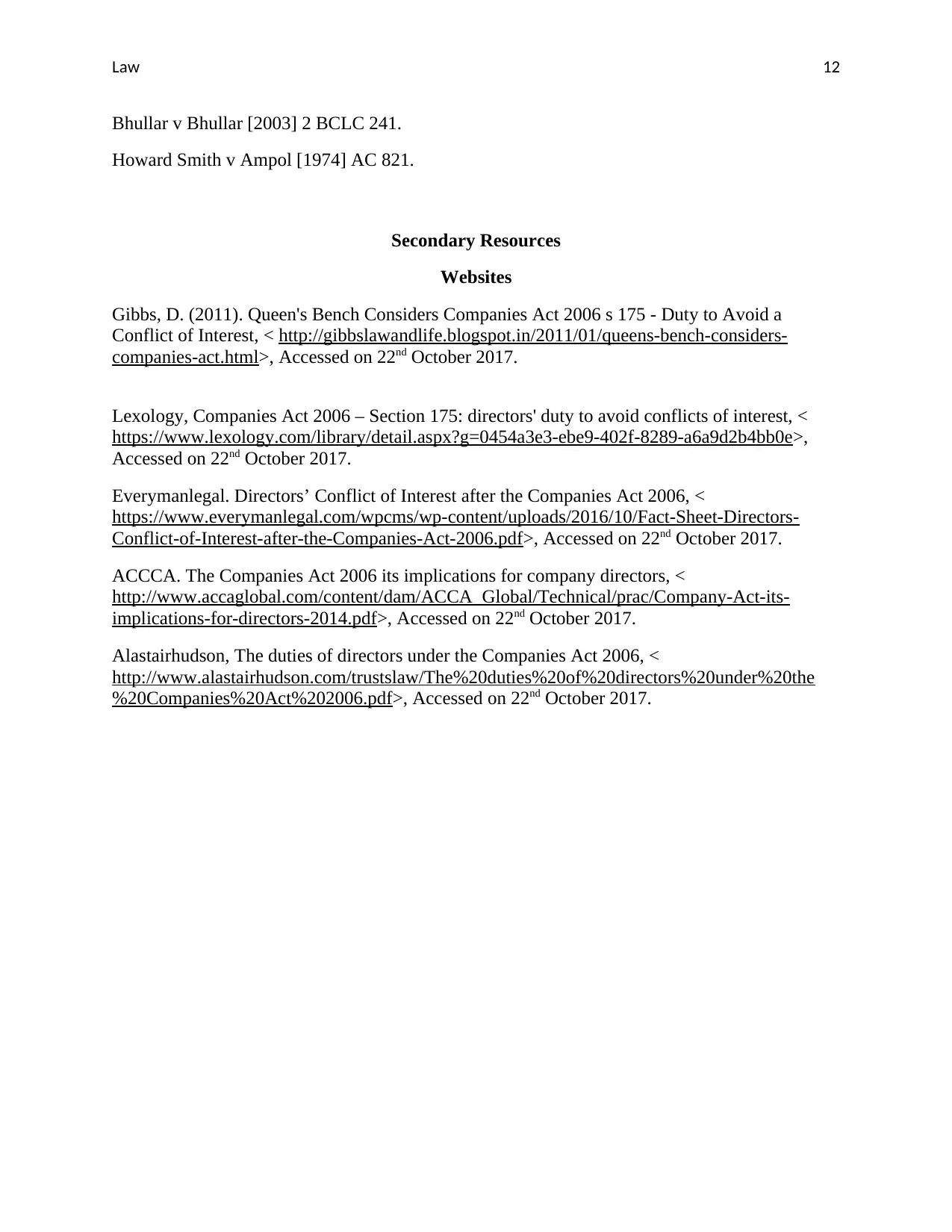
Law 12
Bhullar v Bhullar [2003] 2 BCLC 241.
Howard Smith v Ampol [1974] AC 821.
Secondary Resources
Websites
Gibbs, D. (2011). Queen's Bench Considers Companies Act 2006 s 175 - Duty to Avoid a
Conflict of Interest, < http://gibbslawandlife.blogspot.in/2011/01/queens-bench-considers-
companies-act.html>, Accessed on 22nd October 2017.
Lexology, Companies Act 2006 – Section 175: directors' duty to avoid conflicts of interest, <
https://www.lexology.com/library/detail.aspx?g=0454a3e3-ebe9-402f-8289-a6a9d2b4bb0e>,
Accessed on 22nd October 2017.
Everymanlegal. Directors’ Conflict of Interest after the Companies Act 2006, <
https://www.everymanlegal.com/wpcms/wp-content/uploads/2016/10/Fact-Sheet-Directors-
Conflict-of-Interest-after-the-Companies-Act-2006.pdf>, Accessed on 22nd October 2017.
ACCCA. The Companies Act 2006 its implications for company directors, <
http://www.accaglobal.com/content/dam/ACCA_Global/Technical/prac/Company-Act-its-
implications-for-directors-2014.pdf>, Accessed on 22nd October 2017.
Alastairhudson, The duties of directors under the Companies Act 2006, <
http://www.alastairhudson.com/trustslaw/The%20duties%20of%20directors%20under%20the
%20Companies%20Act%202006.pdf>, Accessed on 22nd October 2017.
Bhullar v Bhullar [2003] 2 BCLC 241.
Howard Smith v Ampol [1974] AC 821.
Secondary Resources
Websites
Gibbs, D. (2011). Queen's Bench Considers Companies Act 2006 s 175 - Duty to Avoid a
Conflict of Interest, < http://gibbslawandlife.blogspot.in/2011/01/queens-bench-considers-
companies-act.html>, Accessed on 22nd October 2017.
Lexology, Companies Act 2006 – Section 175: directors' duty to avoid conflicts of interest, <
https://www.lexology.com/library/detail.aspx?g=0454a3e3-ebe9-402f-8289-a6a9d2b4bb0e>,
Accessed on 22nd October 2017.
Everymanlegal. Directors’ Conflict of Interest after the Companies Act 2006, <
https://www.everymanlegal.com/wpcms/wp-content/uploads/2016/10/Fact-Sheet-Directors-
Conflict-of-Interest-after-the-Companies-Act-2006.pdf>, Accessed on 22nd October 2017.
ACCCA. The Companies Act 2006 its implications for company directors, <
http://www.accaglobal.com/content/dam/ACCA_Global/Technical/prac/Company-Act-its-
implications-for-directors-2014.pdf>, Accessed on 22nd October 2017.
Alastairhudson, The duties of directors under the Companies Act 2006, <
http://www.alastairhudson.com/trustslaw/The%20duties%20of%20directors%20under%20the
%20Companies%20Act%202006.pdf>, Accessed on 22nd October 2017.
⊘ This is a preview!⊘
Do you want full access?
Subscribe today to unlock all pages.

Trusted by 1+ million students worldwide
1 out of 12
Related Documents
Your All-in-One AI-Powered Toolkit for Academic Success.
+13062052269
info@desklib.com
Available 24*7 on WhatsApp / Email
![[object Object]](/_next/static/media/star-bottom.7253800d.svg)
Unlock your academic potential
Copyright © 2020–2025 A2Z Services. All Rights Reserved. Developed and managed by ZUCOL.





